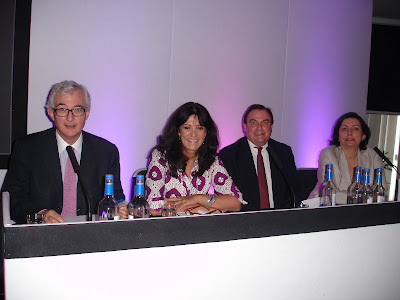 .....for Ed Victor (and Jerry Hall) to make their grand entrance
.....for Ed Victor (and Jerry Hall) to make their grand entranceSo that's another Nibbies done and gone. As ever, it had some choice moments. Just how much was Ed Victor enjoying his walk up the red carpet with Jerry Hall? Who is burlesque model Modesty Blaise and why was she there? Why were all the titles shortlisted for the Tesco Biography of the Year, autobiographies? How surreal was it to have Jerry Springer presenting an award, and wasn't he good?
Of course, Barack didn't turn up - gosh, what a surprise - but his non-appearance was a gift for all those comedian presenters, few of whom - any? - he, or his fellow Americans, have heard of.

Jo Brand? Jack Dee? Dara O'Briain? Thankfully, Simon & Schuster's Carolyn Reidy (
above) over from the US, had her UK MD Ian Chapman with her to expalin. Brand said that the reason the President couldn't be there in person to collect his Nibbie for Tesco Biography of the Year (biography of who?), was that "he's back at my place, wearing one of my Brentford Nylon nighties and warming up the cocoa - at least, I hope he is".
If Barack couldn't be there, we did have Sebastian Faulks (
below) arriving in true Presidential style to collect the Sainsbury's Popular Fiction Award for
Devil May Care (Penguin). W

ith Bond girl Tuuli Shipster (the model on the book's jacket) on his arm, they purred up to the red carpet in a vintage Bentley. Sadly, they were somewhat eclipsed by the aforementioned Hall and Victor who sent the paparrazis' shutters into overdrive.
I snatched a quick word with big Jerry and asked her what was on her bedside table. "I've just finished the last Alain de Botton. I've read all his books. But lately, because I've been working on my own book [due from HarperCollins] I've been reading lots of autobiographies. I really liked Steve Martin's and Bob Dylan's."
The red carpet is one of the Nibbies greatest rituals, with authors such as Cecelia Ahern (
below) signing autographs and enjoying an Oscars atmosphere (the awards are rightly billed the Oscars

of the book industry). Having said that, arrivals tend to go like this: 'Big name author, celebrity I haven't heard of celebrity I haven't heard of celebrity I haven't heard of, actress I vaguely recognise, big name author, publisher ignored by photographers publisher ignored by photographers publisher ignored by photographers, reality TV star, cable channel presenter, big name author, celebrity I haven't of celebrity I haven't heard of etc etc etc' Amusingly, it's no good asking publishers who x is, because they usually don't know either.
Then it's into the Great Room of the Grosvenor Hotel, on Mayfair's Park Lane, for what turned out be a somewhat slimmed down, credit crunch Nibs this year. There was no champagne reception, just straight into dinner where, not surprisingly, there were some 100 fewer tables. Publishers cannot make staff redundant, then take two tables at the Galaxy British Book Awards at £295 a head, plus VAT.
Richard Madeley and Judy Finnigan hosted once again, and if it is all a bit cringe-making at times with painful links, it's churlish to carp when the R&J vehicle remains far and away the most successful marketing phenomenon the UK book trade has ever known. Yet small matters gripe. The Tesco Biography of the Year Award should surely be renamed the Tesco Life Story of the Year Award which would then allow biographies and autobiographies to be included. It is simply silly to have autobiographies shortlisted for such an award.
Footage from previous Richard & Judy shows are shown, with 'celebrities' discussing shortlisted books. But no captions are ever put up telling us who these people are. Ask at your table and you'll find nobody knows.

Time was when the whole affair was broadcast to a big audience on Channel 4. Now it is only on Watch TV (tonight, Sunday, 5 April at 8pm, Sky Channel 109/Virigin 124),whose viewing figures are probably on a par with supermarket CCTV systems. It is absurd that is no longer on a mainstream channel because it offers glitz and glamour, and undoubtedly makes the world of books sexy.
There were touching moments. Towards the end of the evening, the screens showed pictures of those writers and industry figures who had passed away last year: Arthur C Clarke, Michael Crichton, Harold Pinter, Alexander Solzenhitsyn, Simon Gray, Oliver Postgate, Pat Kavanagh,

John Updie, David Foster Wallace, John Mortimer and, lastly, Fred Newman, co-creator of the Nibbies and to whom
Richard & Judy producer, Amanda Ross dedicated the evening. Among those watching the role-call was 90-year-old Diana Athill, once Updike's UK editor.
There was emotion too when Erland Larson, Stieg Larson's father, collected the Books Direct Crime Thriller of the Year award for Girl with the Dragon Tatoo on behalf of his son. His tribute to Harvill founder Christopher MacLehose (above) met with warm applause. "Without publishers, the writer is nothing," he said.
And the best moment? These exchanges between Madeley and Springer. What did he think of Jerry Springer: The Opera? "It's very strange, because I can't share the experience with anyone. I can't ring up Carmen or Figaro and say, 'Hey, how was your opera, man?'". Would he be writing an autobiography. "What makes you think any of my fans can read?"
 Right wing Obama fan?: Jeffrey Archer and wife Mary at Hatchards Authors of the Year party
Right wing Obama fan?: Jeffrey Archer and wife Mary at Hatchards Authors of the Year party






























